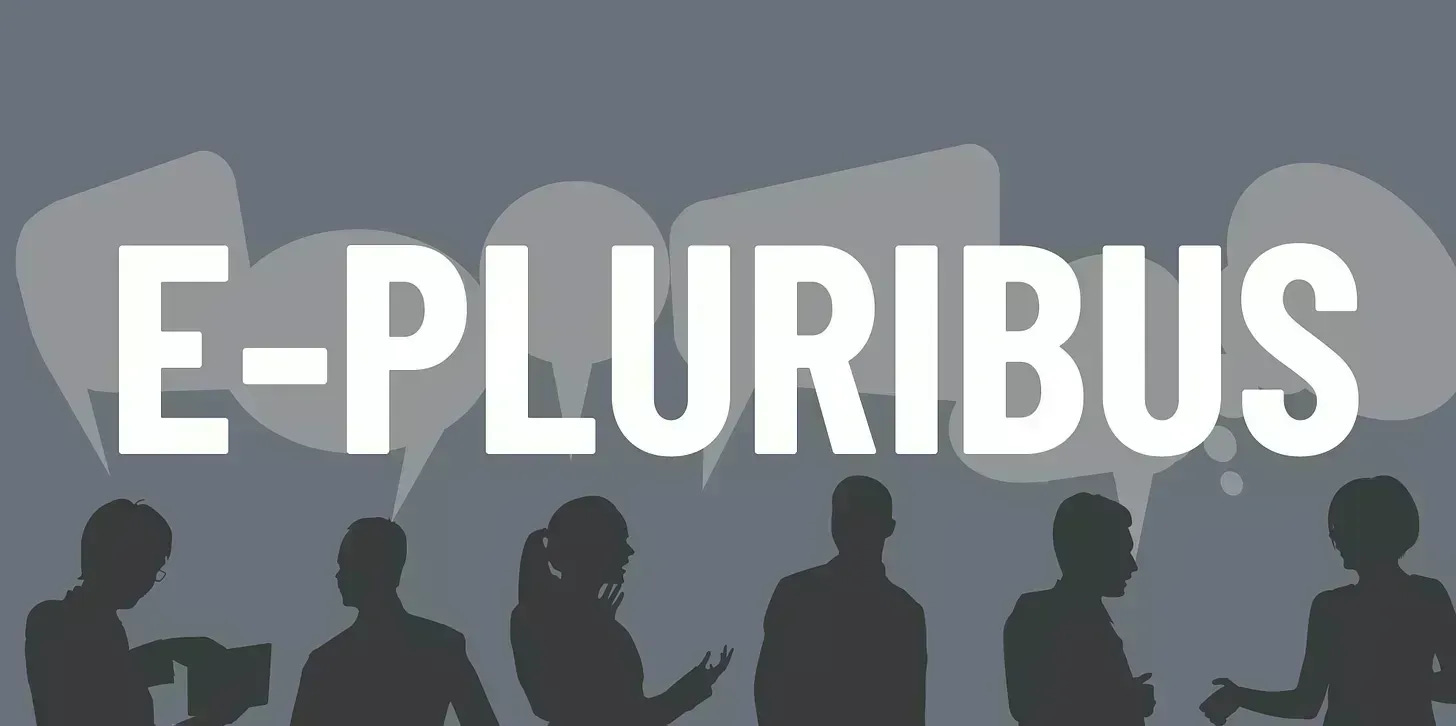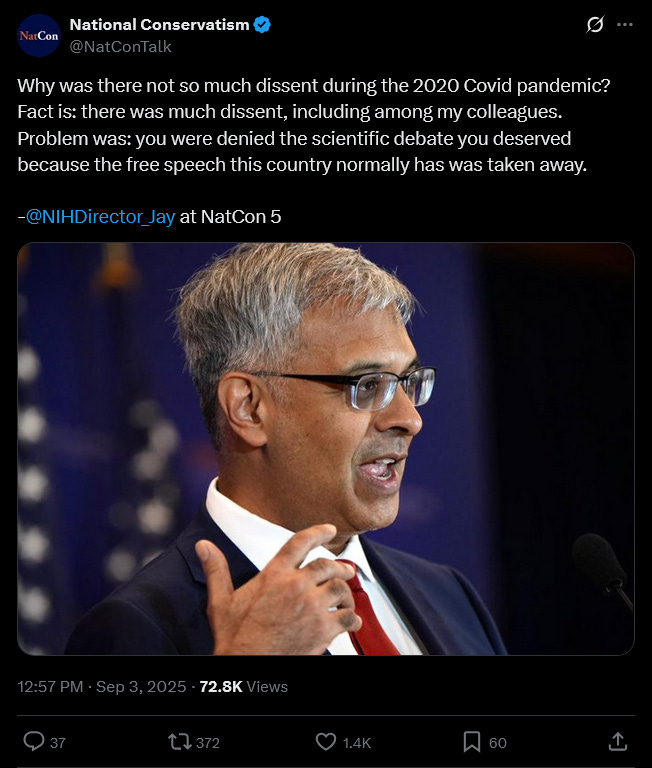E-Pluribus |September 11, 2025
Charlie Kirk murdered. Illiberal Europe's growing censorship problem. Cops should stop crime, not speech.
A round-up of the latest and best insight on the rise of illiberalism in the public discourse:
New York Times: Charlie Kirk’s Horrific Killing and America’s Worsening Political Violence
Conservative activist Charlie Kirk was murdered this week during one of his signature campus debates at a Utah university. Few other details have been released. What’s certain, however, is that nobody should be gunned down while trying to respectfully engage their political opponents. The New York Times editorial board pinpoints that key takeaway—and warns that college students are increasingly rejecting this bedrock principle of liberalism:
While the motives of Mr. Kirk’s killer are unclear, Mr. Kirk was a prominent political figure speaking at a political event. His killing is political in its consequences.
Such violence is antithetical to America. The First Amendment — the first for a reason — enshrines our rights to freedom of speech and expression. Our country is based on the principle that we must disagree peacefully. Our political disagreements may be intense and emotional, but they should never be violent. This balance requires restraint. Americans have to accept that their side will lose sometimes and that they may feel angry about their defeats. We cannot act on that anger with violence.
Thirty-four percent of college students recently said they supported using violence in some circumstances to stop a campus speech, according to a poll from the Foundation for Individual Rights and Expression published a day before the Kirk shooting. Since 2021, that share has risen from 24 percent, which was already unacceptably high. Surveys of older adults are similarly alarming.
Taveon Kjartan Shull: The Erosion of Free Speech
Free speech proponents have zeroed in on the UK’s newfound willingness to lock up its citizens for wrongthink. But perhaps we should broaden our focus. At the Mises Institute, Taveon Kjartan Shull examines several horrifying cases in which European governments punished people for speech, arguing that such censorious conduct is becoming more common in the EU:
Most Western nations claim that they honor free speech. Constitutions around the world are centered around it. But if you move outside the political consensus in many European countries, that promise increasingly rings hollow. While this is prevalent in many European countries, Germany has some particularly dramatic examples this essay will analyze. In April 2025, a right-wing journalist named David Bendels got a seven-month sentence on parole for the crime of “defamation.” His crime? Photoshopping the sentence “I hate freedom of speech” on a chalkboard held by the Federal Minister of the Interior Nancy Faeser.
The irony almost seems like a Greek tragicomedy: by criminally punishing someone for criticizing the government’s hostility to free speech, the state validates the very critique.
Even more shocking to the theoretical concept of free speech, which modern democracy claims to uphold, is the start-up which was co-founded by the leader of the youth organization of the “classical liberal” party of Germany I am also a member of, Franziska Brandmann. The start-up “So Done” has made it their mission to hand in as many lawsuits for expression in the digital world as possible. Using AI to scour social media sites after “defamatory” or “insulting” comments directed at their clients, they then streamline the lawsuit and legal costs, profiting by taking a commission from every citizen convicted for his speech.
Quoting their website: “We help people who are repeatedly victims of online hate to filter out relevant comments, have them legally reviewed by a law firm, and take legal action against the perpetrators with our litigation funding.” In practice, it’s a for-profit censorship machine—an unholy alliance of automated surveillance, legal intimidation, and moral crusading. Orwell would have called it a Ministry of Digital Purity.
Martin Evans, Charles Hymas: Scrap non-crime hate incidents, says police watchdog
UK law enforcement should focus on arresting criminals — murderers, thieves, rapists — not citizens whose speech offends the political class, says police watchdog Sir Andy Cooke, His Majesty’s Inspector of Constabulary (HMIC). As common sense dictates, words can be offensive without being illegal. The Telegraph reports:
Non-crime hate incidents (NCHIs) should be scrapped, the head of the police watchdog has said, as he urged forces to exercise common sense and focus on the issues that matter to the public.
Sir Andy Cooke, His Majesty’s Inspector of Constabulary (HMIC), said free speech must be protected, adding that the police had to “separate the offensive from the criminal”.
Publishing his annual state of policing report, Sir Andy said public confidence and trust remained too low and officers needed to be more visible and responsive to community concerns.
…
Sir Andy said the general public want forces to concentrate on the issues that mattered to them such as reducing street crime, anti-social behaviour, shoplifting and violence.
He said: “Police still need to get the basics right and focus on the issues that matter to the public.
“I think we need to separate the offensive from the criminal. We need at times to allow people to speak openly without the fear that their opinions will put them on the wrong side of the law.
“I’m a firm believer that non-crime hate incidents are no longer required, and that intelligence can be gathered in a different way, which would cause less concern to the public and would make recording of such issues much easier for policing.”
…
And Sir Andy said it was time to look again at the policy and legislation around these issues, warning that the police were currently being placed in an “invidious position”.
“As we know, discretion and common sense don’t always win out in these issues,” he added.
Sir Andy said while there were many “distasteful” and “offensive” things published online it was the police’s job to “deal with criminality across the board”.
The state of policing report recognised that forces had made improvements over the past 12 months but said public confidence remained too low.
Around X
There’s little we can add to this post from Chloe Cole. Hopefully the violence we saw this week goes no further (click for video).
There were plenty of scientists who objected to the authoritarianism we experienced during the COVID pandemic. The new head of the National Institutes of Health, Dr. Jay Bhattacharya, explains why we didn’t hear from many of them:
Comedian Graham Linehan was arrested last week in London for posting mean tweets. Judging by his response, the run-in with law enforcement seems to have backfired:









